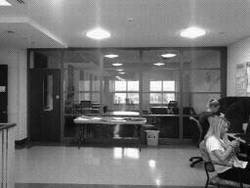Superstorm Sandy Causes Professors, Students to Alter Original Plans as Semester is Shortened
It has been almost a month since Superstorm Sandy has hit, and both students and faculty are trying to get back to a sense of normalcy. However, there has been some dispute as to how the rest of the semester will go now that students have a shortened semester.
Some students have had to meet their original deadlines as professors continue to follow their syllabi while others are adjusting and trying not to overload their students.
“My professor has been making adjustments to a lot of assignments, and I had to go to a make-up class, so it has been a bit more stressful because there is even more of a workload than there usually is this time of year,” said Mary Fulco, junior. “I have been spending a lot of time at the library trying to get things done because now I do not have a lot of extra time.”
It is not only the students that have been stressed about the constrained semesters. Several professors have had to change test dates, guest speakers, and revise their syllabi schedule for the rest of the semester.
“For the most part, my courses are following their current syllabi,” says Dr. Stanley Blair, English professor.
“Because of several university closures on assignment due dates, some of those due dates necessarily had to be shifted later by a week or two. In the case of one portion of one course, I have changed the course content delivery method from student presentations to lecture and discussion to ensure that course content will be unaffected. The post-Thanksgiving portions of my courses are generally unaffected,” said Blair.
There have been a lot of adjustments for both students and professors alike, especially seeing as some are still having issues with transportation and power. Even with all the extra work, students are trying to remain optimistic.
“It’s finally nice to be back, but with all the work that’s due it has been hard,” says Kevin Davis, a senior who is planning to graduate this spring. “I believe that if students work hard, they can rise to the challenge. I have just been working longer and working more on my schoolwork. That is all I can do.”
Most professors were just as affected by the storm as students were, so it seems that there is a general understanding that it will be a while before things get completely back to normal.
“I, myself, was fortunate in that my home neither lost power nor sustained any flooding. I do know, however, that many of my students were not so lucky,” says Dr. Johanna Foster, gender studies professor. “From what I can tell, most students lost power to their homes, many faced a good deal of storm clean-up at their parents’ or grandparents’ residences throughout the tri-state area, and a small number sustained devastating, life-altering damage to property or to the health of loved ones.”
“I am adjusting by trying my best to help students access the university resources that we have available, which are tremendous, and to lend a listening ear. I also made changes to the course schedule of readings and assignments to help strike a balance between the need to respect students’ experiences of the traumas related to the storm with their concerns about being overwhelmed by missed coursework,” Foster said.
The departments do realize that the rest of the semester is going to be a bumpy one. Several of my professors have been very sympathetic and empathetic seeing as they have been through the same ordeal.
All of them have been lending a hand and offering an open ear to students who may need a bit of extra help during this period of recovery.
There has been a lot of devastation that we have all experienced, and as a community I have seen the students and professors here at Monmouth really pull together.
As Dr. Blair said and put it best, “As people, the entire university community was affected by Superstorm Sandy. Regardless of the role each of us plays in that community, we are all people first. Recognition of that has been readily apparent in the consideration, generosity, and caring that I have seen students and employees demonstrate toward each other and toward residents in affected communities.”
“While the Superstorm caused destruction, hardship, and inconvenience, it also had more positive effects, providing an opportunity for us individually to reflect on what is important in our lives and collectively helping to foster sincere sympathy and communal solidarity,” said Blair.
It seems that the work between students and teachers is on a case-by-case basis, but most have been trying to make the best of the situation.
It will take months for all of us to recover from the devastation that has occurred from Hurricane Sandy, especially in our area which did suffer significant damage.
However, it seems that returning to normalcy is the best thing we can do, as we should not let what happened rule our lives.
As a community we have and all strive towards one goal- successfully finishing the semester and growing from these experiences to become more prepared and more appreciative of what we do have in our lives.
We all need to remain as a community and remain strong.


